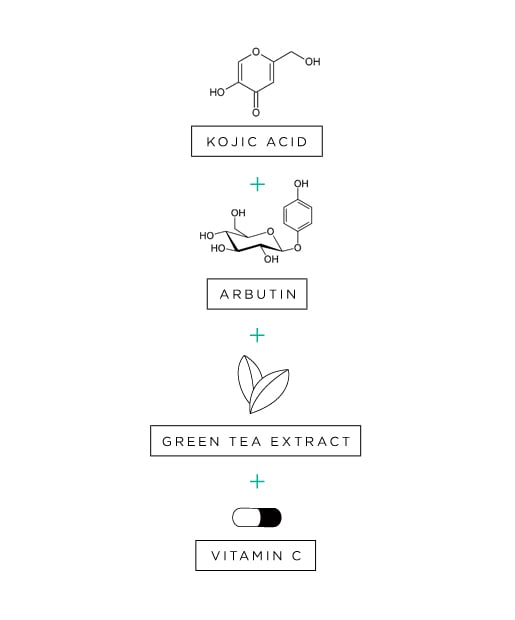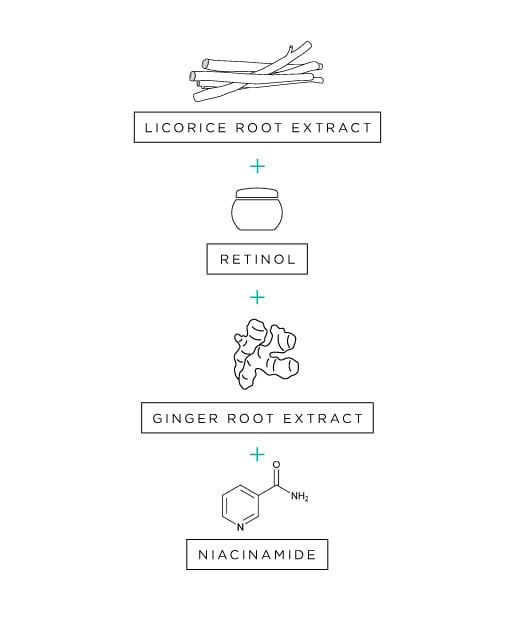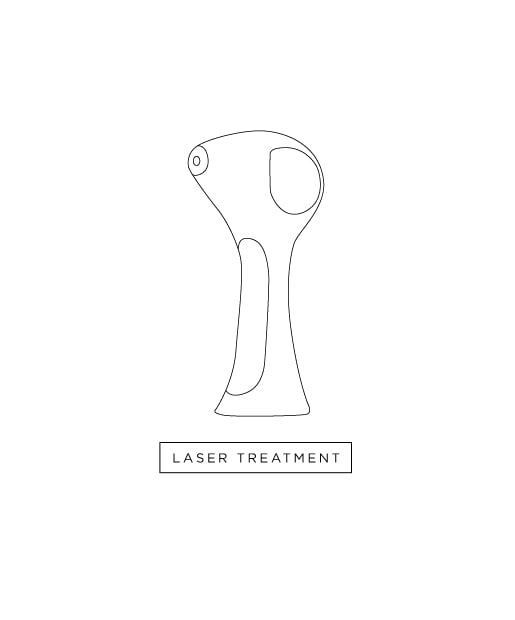Best for: dark spots from acne and oily skin
Kojic acid: It not only suppresses tyrosinase activity, kojic acide also helps topical treatments penetrate more deeply into the skin.
Arbutin: Extracted from the bearberry plant, arbutin is a natural alternative to hydroquinone. It curbs melanocyte activity and helps break down extra melanin in the skin.
Green tea: This natural, soothing antioxidant blocks free radicals.
Vitamin C: Also referred to as ascorbic acid, this antioxidant not only inhibits tyrosinase, it also treats oily skin by blocking pore-clogging debris.
Kojic acid: It not only suppresses tyrosinase activity, kojic acide also helps topical treatments penetrate more deeply into the skin.
Arbutin: Extracted from the bearberry plant, arbutin is a natural alternative to hydroquinone. It curbs melanocyte activity and helps break down extra melanin in the skin.
Green tea: This natural, soothing antioxidant blocks free radicals.
Vitamin C: Also referred to as ascorbic acid, this antioxidant not only inhibits tyrosinase, it also treats oily skin by blocking pore-clogging debris.
Best for: acne scars
Licorice: The extract from licorice root is naturally high in glabridin, a chemical compound that inhibits tyrosinase.
Retinol: This vitamin A derivative encourages old skin cells to shed and uncovers new cells.
Ginger root extract: This antioxidant works as an anti-inflammatory to protect skin from harsher topical skin care products. It is also used to stimulate melanocyte activity in skin cells, evening out patches of skin that are too lightly pigmented.
Niacinamide: This ingredient inhibits melanosome transfer to surrounding skin cells while increasing skin's moisture and enhancing the barrier function of skin.
Licorice: The extract from licorice root is naturally high in glabridin, a chemical compound that inhibits tyrosinase.
Retinol: This vitamin A derivative encourages old skin cells to shed and uncovers new cells.
Ginger root extract: This antioxidant works as an anti-inflammatory to protect skin from harsher topical skin care products. It is also used to stimulate melanocyte activity in skin cells, evening out patches of skin that are too lightly pigmented.
Niacinamide: This ingredient inhibits melanosome transfer to surrounding skin cells while increasing skin's moisture and enhancing the barrier function of skin.
According to Woolery-Lloyd, combination therapies are the best umbrella treatment for every type of hyperpigmentation, but there's another treatment option available for dark spots.
"[Dark] spots ... are more superficial forms of hyperpigmentation -- the pigment is relatively shallow on the skin. They can be lasered off," Woolery-Lloyd says. Other types of hyperpigmentation, such as melasma, occur deeper in the skin. Although there are some melasma lasers on the market, Woolery-Lloyd notes that they're highly controversial. Most derms, Woolery-Lloyd included, recommend sticking to topical treatments and implementing lifestyle changes.
"[Dark] spots ... are more superficial forms of hyperpigmentation -- the pigment is relatively shallow on the skin. They can be lasered off," Woolery-Lloyd says. Other types of hyperpigmentation, such as melasma, occur deeper in the skin. Although there are some melasma lasers on the market, Woolery-Lloyd notes that they're highly controversial. Most derms, Woolery-Lloyd included, recommend sticking to topical treatments and implementing lifestyle changes.








